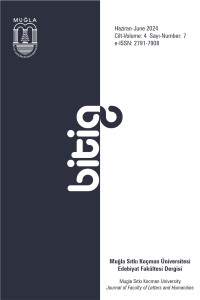Abstract
Arkaik düşünceye göre insan yaratılır. Tanrının istediği şekilde davranış sergileyen yol gösterici üstatların kalıplaşmış eylemlerini öğrenmeye çalışarak “doğal bir insan” olma yolundan çıkar ve toplumun çizdiği kurallar çerçevesinde yeniden doğar. Bu yeniden doğuş biyolojik değildir. Kutsal tarihe ait ruhun yeniden doğmasıdır. Bir toplumun varlığıyla aynı yaşta sayılan inisinasyon törenleri farklı disiplinler için araştırma konusu olmuştur. Çalışmalardan birisi de Rumen yazarı, filozof, mitoloji bilgini ve dinler tarihçisi Mircea Eliade tarafından hazırlanmıştır. Kitapta erginlenme kavramı dinler tarihçisi bakış açısıyla yeniden yorumlanmıştır. Sözlü kültür dönemini aşamayan ilkel toplumlardan başlanarak, modern insanın hayatındaki erginlenme evrelerinin değişimi somut örneklerle detaylı bir şekilde incelenen eserde, din ve dindışı toplumların inisinasyon törenlerini din, gelenek, alışkanlıklar ve ortak duygular noktasında yorumlanması bakımından literatüre önemli bir katkı sağlamaktadır.
References
- Eliade, Mircea (1944), Edebi Dönüş Mitosu, çev. Ümit Altuğ, Ankara: İmge Kitabevi.
- Eliade, Mircea (2015), Doğuş ve Yeniden Doğuş- İnsan Kültürlerinde Erginlenmenin Dini Anlamları, çev. Fuat Aydın, İstanbul: Kabalcı Yayınları.
Abstract
According to archaic thought, man is created. By trying to learn the stereotyped actions of the guiding masters who behave in the way God wants, he gets out of the way of becoming a "natural person" and is reborn within the framework of the rules drawn by society. This rebirth is not biological. It is the rebirth of the soul of sacred history. Initiation ceremonies, which are considered to be the same age as the existence of a society, have been the subject of research for different disciplines. One of the works was prepared by the Romanian writer, philosopher, mythology scholar and historian of religions Mircea Eliade. In the book, the concept of maturation is reinterpreted from the perspective of a historian of religions. Starting from primitive societies that could not overcome the oral culture period, the change of maturation stages in the life of modern people is examined in detail with concrete examples, and the work makes an important contribution to the literature in terms of interpreting the initiation ceremonies of religious and secular societies in terms of religion, traditions, habits and common feelings.
Keywords
References
- Eliade, Mircea (1944), Edebi Dönüş Mitosu, çev. Ümit Altuğ, Ankara: İmge Kitabevi.
- Eliade, Mircea (2015), Doğuş ve Yeniden Doğuş- İnsan Kültürlerinde Erginlenmenin Dini Anlamları, çev. Fuat Aydın, İstanbul: Kabalcı Yayınları.
Details
| Primary Language | Turkish |
|---|---|
| Subjects | Turkish Folklore (Other) |
| Journal Section | Book Reviews |
| Authors | |
| Early Pub Date | June 12, 2024 |
| Publication Date | June 14, 2024 |
| Submission Date | April 16, 2024 |
| Acceptance Date | May 10, 2024 |
| Published in Issue | Year 2024 Volume: 4 Issue: 7 |
Cite
bitig Journal of Faculty of Letters is licensed under a  Creative Commons Attribution-NonCommercial-ShareAlike 4.0 International License.
Creative Commons Attribution-NonCommercial-ShareAlike 4.0 International License.


